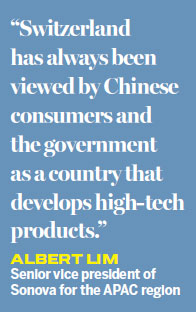Sino-Swiss links are in peak condition

Business links between China and Switzerland are expected to be further enriched by a bilateral free trade agreement and investment in sophisticated service businesses and high-tech manufacturing over the next decade, say officials and business leaders from both sides.
Shen Danyang, spokesman for China's Ministry of Commerce, says that even though both the Chinese and Swiss economies have been affected by the global economic downturn, the degree of interdependence between the two remains stable in bilateral trade.
Eager to enhance their earning abilities, China and Switzerland signed one of the highest-level and most comprehensive free trade agreements in July 2014, covering environmental issues, employment matters and intellectual property protection.
Since the implementation of the China-Switzerland FTA, the volume of bilateral trade has turned around from dropping 27 percent year-on-year in 2014 to 1.7 percent growth to reach $44.26 billion (41.7 billion euros; 36.42) in 2015, data from the General Administration of Customs show.
China mainly ships electrical equipment, metal products, furniture, organic chemicals and garments to Switzerland. Watches, industrial instruments and parts, medicine and healthcare products are the main products Switzerland exports to China.

"Both sides are currently working on the next stage of the agreement," says Shen. "The China-Switzerland FTA will exert a more positive influence on the promotion of trade and investment promotion and benefit more companies in the two countries."
China's exports to Switzerland in particular, maintained a favorable momentum in the first half of this year, while bilateral trade volume amounted to 100.25 billion yuan ($14.42 billion). China's exports to Switzerland also reached 9.85 billion yuan, up 5.6 percent on a year-on-year basis during the six-month period.
"China will continue to export consumer goods in exchange for Switzerland's high-tech products such as electronic goods, industrial parts and medical equipment. Most of the imports are complementary. Therefore, it isn't direct competition," says Lin Shunjie, director-general of department of trade and investment promotion at the China Council for the Promotion of International Trade.
Sonova Group, the world's largest hearing-care services provider by revenue, plans to enter more lower-tier Chinese cities and introduce its first 24-hour rechargeable hearing aid-the Phonak Audeo B-R-in China in 2017, as well as bringing its latest hearing aids for children and adults with severe hearing loss to the country in the future.
"Switzerland has always been viewed by Chinese consumers and the government as a country that develops high-tech products. Sonova has been investing in China for more than 10 years and we will continue to expand as we have in the past," says Albert Lim, senior vice-president of Sonova for the APAC region.
"Our latest project in China is an audiology training academy for the whole Asia-Pacific region. It has been established in our industrial campus in Suzhou," says Lim.
The academy's goal is to develop certified professional courses to continually upgrade and expand the skills of industry professionals.
"Capable Chinese companies are also inclined to acquire Swiss companies to gain cutting-edge technology, especially in chemistry, agricultural products, biology and precision instruments," says He Jingtong, a professor of international trade at Nankai University in Tianjin.
zhongnan@chinadaily.com.cn
(China Daily European Weekly 01/13/2017 page4)
Today's Top News
- Xi calls for promoting volunteer spirit to serve national rejuvenation
- Xi chairs CPC meeting to review report on central discipline inspection
- Reunification will only make Taiwan better
- Outline of Xi's thought on strengthening military published
- Targeted action plan to unleash consumption momentum
- Separatist plans of Lai slammed






























